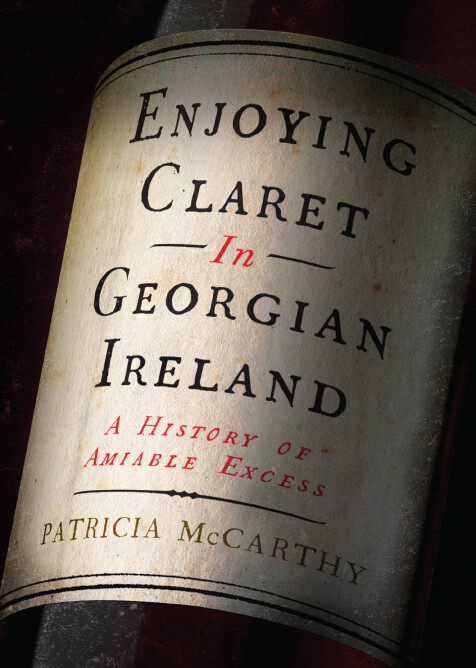Enjoying Claret in Georgian Ireland
A history of amiable excess
Patricia McCarthy
"This is a most enjoyable read, which brings the reader on a convivial journey appropriate to the title. Those interested in wine drinking per se will be entertained by the stock of anecdotes and amusing fables which originate in the witticisms of Jonathan Swift, the sarcasm of Sir Joshua Reynolds or Jonah Barrington, stories about the viceroy who died of over-eating and over-drinking at thirty-three, the image of the bishop of Clogher, Robert Ponsonby Tottenham, bathing in wine to cure his skin condition, and more so the thought of the poor unfortunate villagers who later drank the bath-wine bottled by an entrepreneurial servant! ... Once again Four Courts Press have done an excellent job in producing a beautifully designed and very well-illustrated book." Terence Dooley, Irish Architectural and Decorative Studies, vol. 25
“Dipping in and out of this book was a pleasure … This is a proper book. From glossy attractive jacket to crisp typeface on quality paper, it is a physical delight, an elegant tome, one that sits nicely in the hand, one that impresses immediately. There is a proper heft and substance and a pleasing tactile sensation as you turn the pages … and it is beautifully illustrated … This is not a wine book as such. It is more a social history of a period in Ireland when the upper classes lived high and fast, all seen through the lens of an ocean of wine. Nevertheless it will have great appeal for wine lovers, especially those with a fondness for Bordeaux’s best. Open almost any page, and your eye will be caught by an interesting passage … Patricia McCarthy has done a remarkable job of weaving together myriad strands from a host of sources to tell this tale. The bibliography speaks of laborious, wide-ranging research, and her diligence in that respect has been matched by the publisher’s competence in producing a book for true bibliophiles, on whose shelves this attractive volume deserves a prominent berth. It already has one on mine.” Raymond Blake, The World of Fine Wine, Issue 76, 2022
“Coffee tables of Ireland, prepare to receive a real beaut. In contemporary Ireland, one tends to be well-versed in anecdotes about the demon drink. Who then can resist picking up a book with a front cover showing an image of a labelled bottle containing the enigmatic title Enjoying Claret in Georgian Ireland, followed by the tag-line A History of Amiable Excess … This book is full of information and first-hand descriptions of amiable diversions, at times both serious and amusing, about how the other half lived, drank, and ate in those far-off more class-conscious days – but, at the same time, one must be conscious that excessive alcohol consumption was not the sole prerogative of 18th century manhood. If this book were to sit visibly on the coffee table of a host entertaining a small coterie of amiable guests, one could be confident that it would catch the eye and be opened with curiosity, the chapter headings being an immediate draw. Who could resist diverse headings touching on wine cellars, Irish wine merchants in Bordeaux, dining and wining, paraphernalia of wine-making, male-bonding and toasting, Dublin Castle revellers, role of the monasteries, and wine as a medicine? This book is recommended – both for drinkers and non-drinkers!”. Michael V O’Mahony, the Law Society Gazette (August/September 2022).
“This account of 18th-century Ireland’s love affair with claret, taking off when Irish families (part of the Wild Geese exodus) became involved in the Bordeaux wine trade, is felicitously subtitled “a history of amiable excess”. It discusses, inter alia, the Irish penchant for claret, storing and sale of wine, how the gentry competed to outdo each other in hospitality (viceroys’ popularity depended on their hospitality, one dying of overeating and over-drinking at 33), and the central role of toasting, especially among men-only clubs and fraternities (including the notorious Hell Fire Club). Amusing and interesting stories abound, from Swift, Jonah Barrington and others, as do condemnations from, for example, Samuel Madden and the Earl of Orrery, who called gout (an inevitable rampant side effect) “the Irish hospitality”. Beautifully illustrated, an imbiber’s delight.” Brian Maye, the Irish Times, Saturday 27th August 2022
“Subtitled ‘A History of Amiable Excess’, this book might have been rather ‘niche’ if it was not so interesting, full of anecdotes and revelations of lesser-known facts about Ireland’s gentry in the 18th Century … This book is exhaustively researched, beautifully produced and is a treasure trove of social history. Drink it up”. Anne Cunningham, The Meath Chronicle, 13th July 2022
“Examining questions such as how was the domestic wine cellar planned and used? When did connoisseurship in wine commence and why did ‘toasts’ figure so prominently? McCarthy pours a sobering and enlightened view to these times. Raise a glass to this full-bodied work.” Michael McDermott, Totally Dublin
“Patricia McCarthy’s wonderful Enjoying Claret in Georgian Ireland: A history of amiable excess. Profusely and gorgeously illustrated … this hardback is designed to sit comfortably on your coffee table. But, unlike many of its neighbours, you will have read every line of this ... It is a superb piece of work.” Joe Culley, History Ireland, September/October 2022
“The appeal of alcohol as a libation and the manner I which it was consumed continues to intrigue those with an interest in Irish society in the past as well as in the present ... This is a sympathetic, anecdote-rich and well-illustrated account of the ‘drinking of wine’ and those who did it, which will have broad appeal”. James Kelly, Irish Arts Review, Autumn 2022
“Amusing and interesting stories abound, from Swift and others, as do condemnations, from, for example, Samuel Madden and the Earl of Orrery, who called gout (an inevitable rampant side effect) ‘the Irish Hospitality’. Beautifully illustrated; an imbiber’s delight.” Brian Maye, The Irish Times


